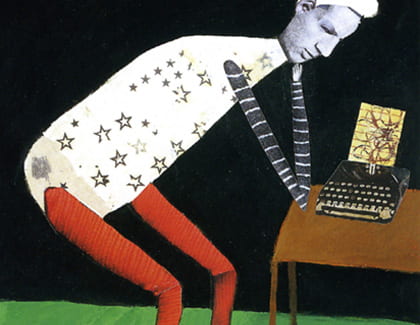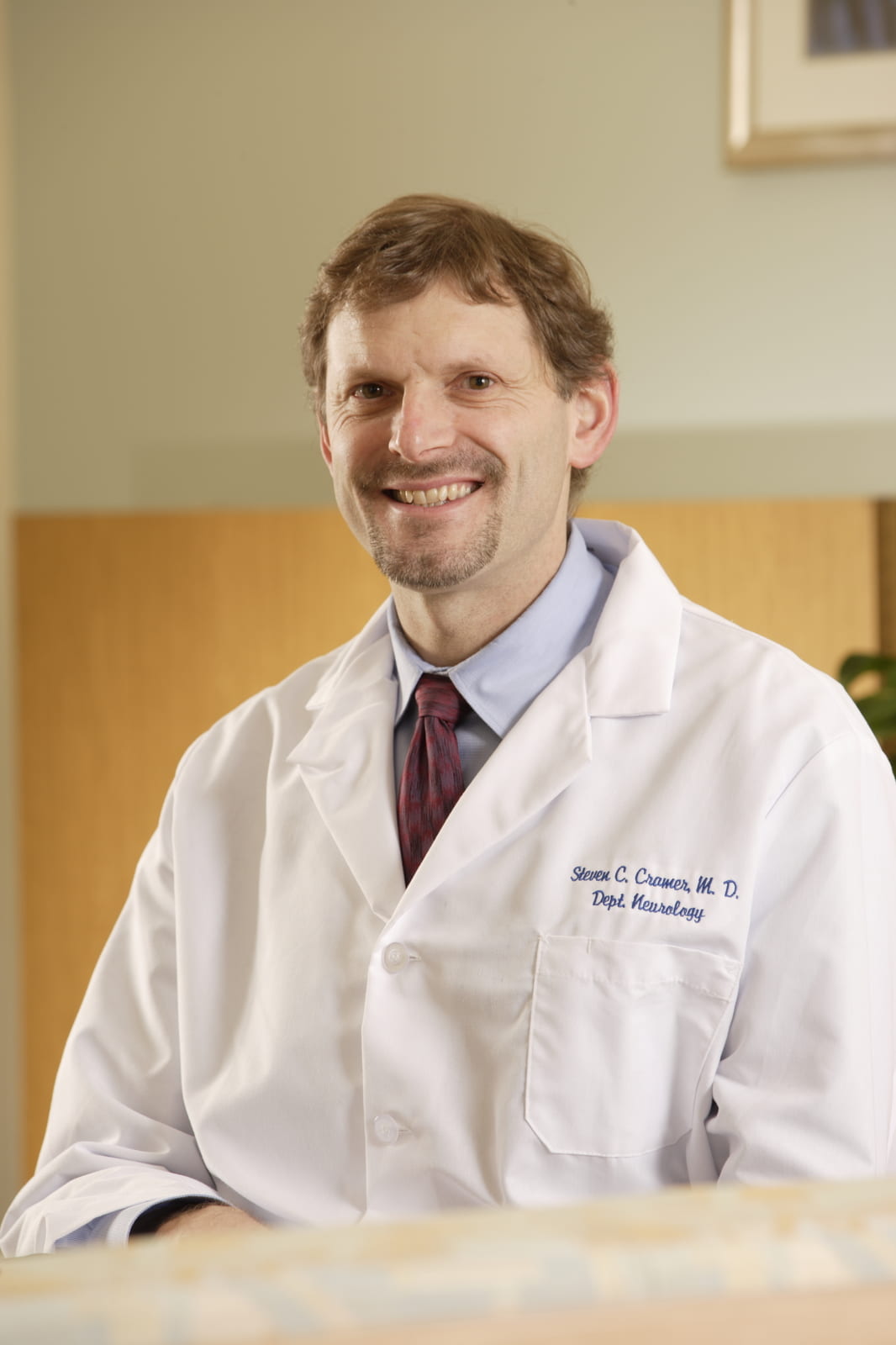The richness of writing
UCI’s illustrious creative writing program continues to make an indelible impression

Michael Golding, M.F.A. ’92 was not looking for literary stardom when he came to UCI’s celebrated Master of Fine Arts program in creative writing a dozen years ago. In fact, in some ways, he seemed to be avoiding it.
Acceptance at UCI meant he had to leave his beloved Venice, Italy, where he had moved several years earlier because of its associations with D.H. Lawrence and his “romantic idea of the golden light.” But the reality of the writer’s life hit him: “I was into my first book and my son was born. Segue to the moment in ‘Carousel,’ when Billy Bigelow walks down the beach and realizes he has a child to feed.”
Golding decided to apply to creative writing programs. “My ulterior motive was to find somebody who liked my writing enough to help me get it published,” he recalls.
He got that – and much more. His graduate thesis was his acclaimed first novel, Simple Prayers, a book influenced by magic realism and his love affair with Venice, describing plague in the 14th century and the year that the spring didn’t come. The Los Angeles Times called it a “delightful, exotic fable … so lavish and so colorful it’s like a meal in the open air, laid out on brocade.”
Happy endings aren’t always the case for graduates of creative writing programs. Critics claim that although these programs produce writers by the truckload, they shortchange students and readers by fostering cookiecutter novels and poems – reducing creativity to conformity.
The program in UCI’s School of Humanities offers a sharp contrast: It has won national accolades for producing Pulitzer Prize-winners, including Michael Chabon, M.F.A. ’87, Richard Ford, M.F.A. ’70 and poet Yusef Komunyakaa, M.F.A. ’80, as well as best-selling novelists such as Alice Sebold, M.F.A. ’98 and Aimee Bender, M.F.A. ’98. Significantly, many of the most heartfelt hosannahs for the program come from its graduates.
Few would accuse Bender of being a cookiecutter writer, with her surreal, lyrical tales of a lonely man who keeps a tiny man for a pet, another who evolves from ape to sea turtle to salamander, a woman giving birth to her mother, a fruit-stand vendor secretly sculpting words out of noble gases, or a baby boy whose fingers are shaped like keys. Bender, whose writing has been compared to “Hemingway on an acid trip” (Los Angeles Times) said that, for her, the influence of UCI was “pretty profound.”
“There was real appreciation and support for my weirder writing, the writing I thought would be dismissed,” says Bender. “I felt some sort of gate opened, and I just drove through.
“It actually shocked me. It felt very right,” she recalls. “I thought people would say, ‘Fairy tales just don’t work in the world of literary writing. You should get over that.’ And there are programs like that.”
Bender’s experience is not a one-off or an accident, any more than Golding’s. The program is designed to encourage the offbeat. According to Geoffrey Wolff, who retires as the program’s fiction director in June, “What we’re proudest of is open-mindedness to a variety of forms. In the last few years, we’ve had two successful, very long novels that couldn’t be less alike. Our writers come from a variety of backgrounds – we have people writing about ghetto culture, barrio culture and various gender persuasions. A crucial component of the students’ culture in these workshops is a hospitality to things they don’t necessarily do themselves. Nobody says, ‘I’m not interested in sailing stories.’”
Style and substance
UCI’s creative writing program was founded in 1965 by James B. Hall, and flourished under Oakley Hall and Donald Heiney (who wrote under the pen name MacDonald Harris), both prolific novelists. “Don was more of a stylist; Oakley more nuts and bolts,” says Michael Ryan, acting director of the poetry program while James McMichael is on sabbatical.
Hall and Heiney made a winning combination, resulting in what Hall calls “the year of the Magic Workshop,” when Chabon’sMysteries of Pittsburgh shot up the national best-seller lists, and was compared to the best of Salinger and Fitzgerald. “Chabon is a flat-out wonderful writer – evocative and inventive, pointed and poignant,” crowed the Chicago Tribune. Almost everyone in that late ’80s cohort was published, says Hall, and published prominently, including James Brown, M.F.A. ’86 (Final Performance); Jay Gummerman, M.F.A. ’88 (We Find Ourselves in Moontown); Louis B. Jones, M.F.A. ’87 (Ordinary Money); and Michelle Latiolais, M.F.A. ’87 (Even Now). Latiolais now co-directs the fiction program with Wolff.
A critical component in the program’s success is selectivity. Only a dozen new students are accepted each year, and nearly every invited student enrolls. With only 3 percent admitted, UCI has some of the best students of any graduate writing program in the country.
Students lucky enough to attend remember the program’s camaraderie – “There’s an equality at the table together,” says Bender. That’s not accidental. Because all students are supported equally during their two years of coursework (usually with teaching assistantships), they aren’t fighting each other for aid. “There isn’t much competition, because everyone is in the same boat with financial aid and jobs,” agrees Elizabeth Winthrop, M.F.A. ’04, who publishes her first novel, Fireworks, this year with Knopf. “It provided the environment in which I could keep writing and had to keep writing.”
The program’s directors downplay marketing considerations – it’s a distraction from the work at hand. So are the accolades heaped on the program. Ryan resists the label that it’s the “hottest” creative writing program in the country, as Newsweek claimed. “I don’t know what that means. That seems like hype language to me. Perhaps ‘the best’ seems right – but I’m not sure what ‘the best’ means, either. From the time I’ve been here, I felt everything was being done right. I continue to think so. It’s been on this track for a long time.”
As might be expected, candidates receive a thorough vetting; they must submit manuscripts and an autobiographical sketch in addition to three letters of recommendation, college transcripts and other material. What do they look for? According to Ryan, “Talent, intelligence, seriousness – and sanity.”
Applicants come from all walks of life. Bender was an elementary school teacher in San Francisco. Winthrop, a Harvard graduate, was living north of Boston writing SparkNotes, an online study guide. Sebold, a veteran of the New York literary scene, had had two agents and had written three unpublished novels. Golding had been a
New York actor – Romeo in Joseph Papp’s production of the Shakespeare play.
“You can tell if somebody would be overmatched,” says Ryan, a former Yale Younger Poet who has the Lenore Marshall Poetry Prize, the Kingsley Tufts Poetry Award and a National Book Award nomination to his credit. “These students are good, and the level of discourse extremely high. I’ve never had to talk down to them. Sometimes they talk over me.”
Now UCI is facing another selection process. So far, the program has had a winning hand, and the staff wants its luck to continue after the departure of award-winning author Wolff. “The challenge is that we absolutely insist on getting someone who is a good writer,” says Wolff. “Someone who is working, and working actively – not someone who’s in their twilight years, resting on laurels. Someone who is not only willing to teach, but wants to. That narrows the field. Those people are identifiable, by the morale of the places where they’ve taught, by the reputation of their teaching.”
A new chapter
Wolff, however, plans a different kind of pace for himself: “We have a house in Maine, grandchildren on the East Coast. I’m 68 years old, I’ve written 11 books, and I’d like to write one or two more before I croak. It’s certainly the best job I ever had – but it did slow down my writing.”
A happy ending, perhaps – but not every happy ending is the one envisioned. Golding should know. Having written his second novel, Benjamin’s Gift, his own road has taken him to Japan and back to Italy, where his screenplay adaptation of Alessandro Baricco’s Silk, starring Keira Knightley, is filming. Another lesson Golding learned at UCI: “If you insist that everything be linear – pushing forward to publication, ignoring other things that crook their fingers and beckon you to follow – you’ll cut off your richest roads.”

